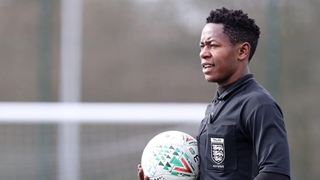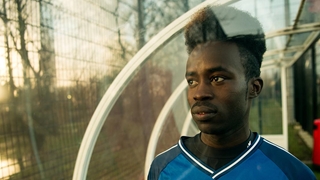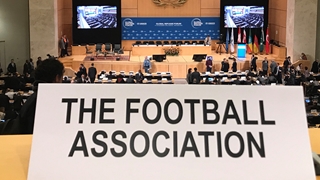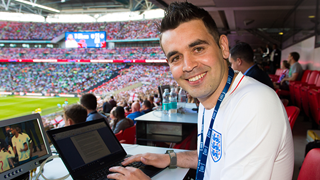
Hi Tasneem, please tell us a little about you and your role at Amnesty?
My role is Women’s Football Officer for Amnesty International UK as part of their ‘Football Welcomes’ programme. The programme initially started off as a weekend celebration to celebrate the contribution of refugees and asylum-seekers to the game of football and the idea behind it is to create more welcoming communities through football. My role focuses on engaging women and girls from refugee and asylum seeking backgrounds, because they tend to be overlooked in football as most of the programmes are traditionally tailored to men. So my role focuses on encouraging initiatives around the country to focus on the women and girls too and give them just as much of a chance to participate and have football play just as much of a role in creating welcoming communities for them as well.
We have our weekend celebration every April when we invite football clubs all the way from the Super League and Premier League right through to grassroots to put on events and activities such as organising matches or tournaments for refugee teams or offering free tickets to refugees and people seeking asylum living locally. We also have our Football Welcomes Community Projects, where we’ve partnered with a variety of County FAs, foundations and football clubs - Aston Villa Foundation, Liverpool County FA and Liverpool FC Foundation, Club Doncaster, Leicester City in the Community and Middlesbrough FC Foundation. Between them they work with up to 70 women and girls from refugee and asylum-seeking backgrounds, I try to basically make sure that they have 50:50 participation of women and girls across their initiatives. And then outside of those five projects, I also work with other County FAs by giving them advice for when they’re first starting up their sessions, on the best ways to set up a session, how to make it sustainable, how to reach out to their local refugee communities and how to engage women and girls specifically within that community.
So what does an average day look like for you?
An average day for me is quite varied because there’s two parts to my role. I’m often in meetings with County FAs, with partners and grassroots initiatives who want to set up sessions for women and girls from refugee and asylum-seeking backgrounds so it can involve quite a lot of emails and consultation phone calls and also working with partners to promote Football Welcomes. And then the other side is the research and production of a guide and online training session which will be released soon on how to engage women and girls from a refugee background and how to best set up a session that is successful and sustainable. That toolkit will be available online for anyone to use, and will be sent out to all County FAs, football club foundations and people within the FA’s Refugees and Football Networking group as well.
How did you get into your role, what led you to it?
I was working previously in refugee resettlement and I worked at a food bank which had an additional service with a local council on helping resettle refugees in the local area. I initially started off as an assistant and ended up running the programme. And I also love football! I've always loved sports, I was a Taekwondo athlete growing up and competed for the Libyan national team. I've always championed women and girls in sport and also discussing and advocating for more diversity in sport. So when this role came about, it seemed like the perfect combination of my love for sport and also my work in the refugee sector.
What are the biggest challenges you face in your role?
The main challenge is that this is quite a new area of work, but I think in the same way that it’s a challenge, it’s also a really great opportunity as well. It’s a much-needed area of work and the reception of it has been really great. I’ve seen some really amazing projects take shape. Some have initially struggled to find their local refugee community and engage them, but then really get into it and put on some great sessions which are very popular. . It’s really important remember that half of the world’s refugees are women, so you’re missing out on half of the community if you’re not doing the outreach work from the beginning.
The biggest benefit of this work I’ve seen is that participants feel like there’s a space for them in football. A lot of the women and girls I’ve spoken to might initially be a little bit nervous about taking part in a football session or trying it out for the first time, but a lot of them have fallen in love with it and they themselves are recruiting other friends and family to join as well. And they’ve mentioned different benefits – a lot of it is around physical and mental health. One of the participants I’ve spoken with said something that I thought was really powerful which was that whilst she was on the pitch she didn’t feel like she had to be someone’s mother, someone’s daughter, sister or wife or anything like that. On the pitch, she was just a football player and she could just forget about the stresses of her life. Having a space where you can run around and have a kick about with a group of friends has been a real morale boost.
And what do you enjoy most about it?
I think my favourite thing about this role is meeting so many people from so many different backgrounds. From the refugee participants that I’ve spoken to, some of them were football players in their home countries and others have never tried football out in their lives, but they all have that same love for it. I just love seeing the participants enjoy the sessions so much. You often find them saying ‘we’re like a family’ about their teammates and coaches, and it shows how they’re building a new home and community for themselves, despite the struggles they faced to get here. So that’s something that brings me a lot of joy to see first-hand.
This week is National Inclusion Week, which aims to celebrate everyday inclusion in all its forms. What does inclusion mean to you and why is it important? How can we use football as a driver for inclusion?
I think inclusion to me means reaching out to every part of a community that is around you, and not just certain parts. And I also think inclusion for me is making sure that the people with the most power and the most resources are reaching out to those with the least, as opposed to the other way around. I feel like the onus lies on institutions like Amnesty UK and the FA and football clubs to reach out to new communities first. This is why it’s really great that there are partnerships forming, like that of AIUK and the FA, to address inclusion of all communities whilst growing the game.
Diversity in general is so important. It widens everyone’s perspective, you learn and benefit so much more when your community has lots of different knowledge and experience share. And one thing I’ve heard from the participants and from coaches and from people running the sessions, and even from local football clubs that play in leagues with refugee football clubs, is that they’re learning just as much from their local refugee community. This may sound like a cliché but football really is a universal language. There’s not really a place in the world that you can go where someone will say ‘I don’t know what football is' so having that as a bridge to meet new people from different backgrounds and to build a new and stronger network is why it’s so important. It just widens your perspective in such a positive way and it challenges a lot of the negative media that you unfortunately see around refugees and people seeking asylum in general.
Find more stories about how football has helped refugees find their feet in England in the 'Related Articles' section below.











